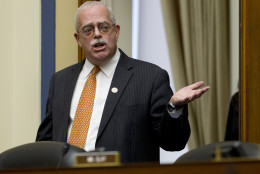Benefits
-
Air Force civilians can now start working part-time while taking some of their retirement annuity.
July 19, 2017 -
Rep. Anthony Brown (D-Md.) introduced the Federal Employee Pension Act of 2017 to reduce the mandatory 4.4 percent pension contributions by new federal employees.
July 18, 2017 -
Senior Correspondent Mike Causey says despite it being home to Congress, Washington, D.C. takes the least vacation time of any other major American city.
July 18, 2017 -
Senior Correspondent Mike Causey says federal and Social Security retirees may be in for a cost-of-living adjustment that’ll trump January’s proposed 1.9 percent pay raise for federal workers.
July 17, 2017 -
Senior Correspondent Mike Causey says current and future federal retirees would lose thousands of dollars in cost-of-living benefits if Congress goes along with the president’s plan to put them on a zero-COLA plan.
July 14, 2017 -
The House Armed Services Committee wants to expand the $40,000 Voluntary Separation Incentive Pay for DoD civilians to 2021.
July 10, 2017 -
The Navy announced its bonus reenlistment numbers for pilots in 2018. Meanwhile, Congress is trying to give more money to the Air Force to retain pilots.
July 10, 2017 -
The Air Force is changing some of its policies to bring squadrons into the 21st century. Meanwhile, the service is reviewing medically separated airmen's disability ratings.
July 10, 2017 -
The Senate Armed Services Committee wants to cut some basic housing allowance for dual military couples to save money in the long run. The committee tried to make more drastic cuts last year, but they did not make it into law.
July 05, 2017 -
Non-existent sweepstakes, phony lotteries, reverse mortgage schemes and counterfeit drugs — fraudsters have unlimited imagination when if comes to separating people from their money, especially retirees and the elderly. Tammy Flanagan, senior benefits director at the National Institute of Transition Planning, offers some advice on avoiding ripoffs on Federal Drive with Tom Temin.
July 05, 2017 -
Have you protected your TSP from the next stock market crash? Financial planner Arthur Stein will explain what you should be doing now to protect your financial assets when he joins host Mike Causey on this week's Your Turn. July 5, 2017
July 04, 2017 -
The House defense authorization bill brought up some important issues for those in the military and their loved ones. Find out what could affect you in the coming year.
June 29, 2017 -
Congress and the White House have a laser-focus on four major parts of the federal civil service retirement program. So which one is going to get the ax?
June 28, 2017 -
Reps. Don Beyer and Gerry Connolly (D-Va.) haven't forgotten about rising premium rates to the Federal Long Term Care Program, and they certainly haven't forgotten about the Office of Personnel Management's response when asked what the agency planned to do about rising costs.
June 23, 2017 -
The Air Force is giving battlefield airmen incentive pay even when they are not in a war zone to encourage them to seek medical care and stay in the service.
June 22, 2017















